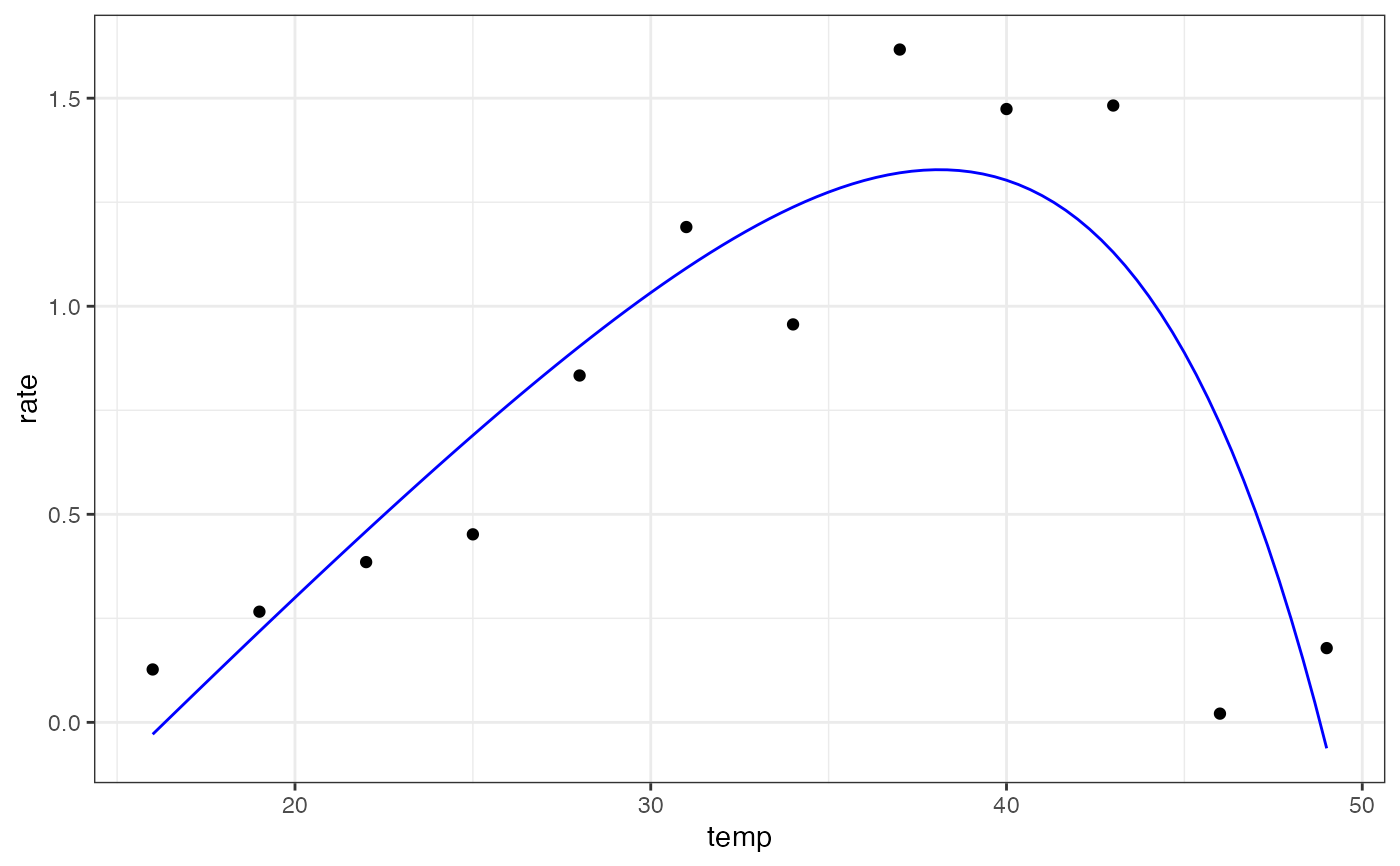
Kamykowski model for fitting thermal performance curves
Source:R/kamykowski_1985.R
kamykowski_1985.RdKamykowski model for fitting thermal performance curves
Value
a numeric vector of rate values based on the temperatures and parameter values provided to the function
Details
Equation: $$rate= a \cdot \big( 1 - exp^{-b\cdot \big(temp-t_{min}\big)}\big) \cdot \big( 1-exp^{-c \cdot \big(t_{max}-temp\big)}\big)$$
Start values in get_start_vals are derived from the data or sensible values from the literature.
Limits in get_lower_lims and get_upper_lims are derived from the data or based extreme values that are unlikely to occur in ecological settings.
References
Kamykowski, Daniel. A survey of protozoan laboratory temperature studies applied to marine dinoflagellate behaviour from a field perspective. Contributions in Marine Science. (1985).
Examples
# load in ggplot
library(ggplot2)
# subset for the first TPC curve
data('chlorella_tpc')
d <- subset(chlorella_tpc, curve_id == 1)
# get start values and fit model
start_vals <- get_start_vals(d$temp, d$rate, model_name = 'kamykowski_1985')
# fit model
mod <- nls.multstart::nls_multstart(rate~kamykowski_1985(temp = temp, tmin, tmax, a, b, c),
data = d,
iter = c(3,3,3,3,3),
start_lower = start_vals - 10,
start_upper = start_vals + 10,
lower = get_lower_lims(d$temp, d$rate, model_name = 'kamykowski_1985'),
upper = get_upper_lims(d$temp, d$rate, model_name = 'kamykowski_1985'),
supp_errors = 'Y',
convergence_count = FALSE)
# look at model fit
summary(mod)
#>
#> Formula: rate ~ kamykowski_1985(temp = temp, tmin, tmax, a, b, c)
#>
#> Parameters:
#> Estimate Std. Error t value Pr(>|t|)
#> tmin 1.634e+01 3.690e+00 4.429 0.00305 **
#> tmax 4.881e+01 1.019e+00 47.895 4.53e-10 ***
#> a 1.000e+02 2.668e+04 0.004 0.99711
#> b 8.469e-04 2.267e-01 0.004 0.99712
#> c 1.214e-01 4.227e-01 0.287 0.78233
#> ---
#> Signif. codes: 0 ‘***’ 0.001 ‘**’ 0.01 ‘*’ 0.05 ‘.’ 0.1 ‘ ’ 1
#>
#> Residual standard error: 0.3717 on 7 degrees of freedom
#>
#> Number of iterations till stop: 96
#> Achieved convergence tolerance: 1.49e-08
#> Reason stopped: Number of calls to `fcn' has reached or exceeded `maxfev' == 600.
#>
# get predictions
preds <- data.frame(temp = seq(min(d$temp), max(d$temp), length.out = 100))
preds <- broom::augment(mod, newdata = preds)
# plot
ggplot(preds) +
geom_point(aes(temp, rate), d) +
geom_line(aes(temp, .fitted), col = 'blue') +
theme_bw()
